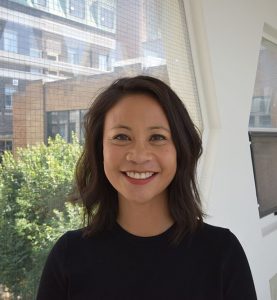Samantha Mayo, an assistant professor at the Lawrence Bloomberg Faculty of Nursing has received funding from the Canadian Institutes of Health Research (CIHR) to better understand the long-term psychosocial and functional outcomes for survivors of non-Hodgkin’s lymphomas, the most common blood cancers in the world. While cure and survival rates for these cancers have improved substantially over the past twenty years, many challenges remain for patients that have successfully completed treatment.
“We know from research among cancer survivors that even when treatment has been completed, there can often be persistent challenges to physical and mental health, such as fatigue and emotional distress, that may impact quality of life over time,” says Mayo, who is also the RBC Financial Group Chair in Oncology Nursing Research.
Recent improvements in the treatment of non-Hodgkin’s lymphoma, have led to an increasing rate of survivorship, making this group one of the fastest growing populations of cancer survivors in Canada. To design effective supportive care services for these survivors, clinicians and health care policy makers need to understand how psychosocial and functional outcomes change over time. They also need to determine what factors improve or worsen over time.
“We want to make sure that optimizing quality of life, becomes an integral part of survivorship care,” says Mayo.
As part of her CIHR funded study, Mayo will be following adults who are cured or achieve long-term remission from non-Hodgkin’s lymphoma for up to two years after their diagnosis, across three hospital sites in Ontario and Quebec. She and her research team will collect data on various aspects of participants’ quality of life, including physical, emotional, social, and cognitive functioning and how these change over time. Her team will also seek to understand how various personal characteristics and environmental factors, such as age, resilience, and social support, influence these outcomes.
“These findings will help clinicians and researchers determine what they might do better to support survivors of lymphoma treatment,” says Mayo. Preliminary interviews with patients and clinicians have revealed that the transition after treatment is usually the toughest period, with some patients expressing concern about the difficulties they face in resuming everyday responsibilities, such as returning to work or accessing follow-up care services when they are not actively in treatment. Clinicians have also indicated that they are not always aware of where they should be referring patients to for support.
“There is a need during this transition time that we want to address,” says Mayo. “If an individual continues to experience persistent symptoms after completing treatment that can keep them from returning to work or school, this can have a significant impact on their life plans. We are hoping to understand how we can best support individuals through this time.”
Mayo and her research team will look to develop sets of interventions based on the needs identified by study participants which might include bolstering resilience or targeting interventions to specific sub-groups after treatment. Exercise and counselling focused interventions have already been tested with other cancer groups with success.
“What makes our study novel is that this emerging population of survivors haven’t been investigated in this way before,” says Mayo. “We will be using Canadian data to inform Canadian practice, with the potential to grow this area of research.”
Looking to the future, Mayo is hopeful that a large enough cohort of patients will be created with an opportunity to follow them beyond the two-year mark.
“Access to survivorship care varies widely,” says Mayo, “An important goal is to ensure equity of access to quality survivorship care to Canadians across the country. This study is an important step to guide how best to develop these services.”
